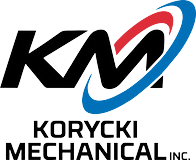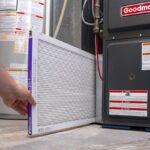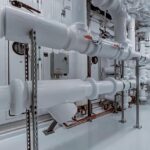You could discover that you need to use your central air conditioning much more frequently than usual to keep your house comfortable when the temperature and humidity outside increase. In both cold and warm weather, humidity levels can affect how comfortable a home is and how well the HVAC system works.
Your HVAC system is put under extra stress during hot weather. But you might not be aware of the effects humidity can have on your ductwork, heating, and cooling systems. It’s not a good idea to turn off your HVAC while it’s hot or cold outside. But how can you maintain your system in the greatest shape? You might be shocked to learn how much humidity is too much and how it might lower your home’s heating and cooling efficiency.
It makes sense that an increase in humidity can wear out your air conditioning equipment and possibly reduce its performance as we head toward the warm weather months because removing excess humidity from the air is one of the key tasks of an air conditioning system.
RELATIVE HUMIDITY
What causes the humidity level to fluctuate? Our atmosphere frequently contains water vapor. The term “relative humidity,” which contrasts how much moisture is in the air with how much water vapor the air can actually retain, is sometimes used by scientists to describe water vapor levels. For instance, a result of 75% humidity indicates that the amount of moisture in the air is around 75% of its maximum capacity.
CENTRAL AIR CONDITIONING SYSTEMS AND HUMIDITY
When your air conditioner is functioning properly, it will remove the right amount of heat and moisture from your living space, creating the cozy atmosphere you desire. If not, your home might not be as comfortable as you would like.
It seems obvious that A/C systems have to work more to keep the home cool when humidity levels are high. If you’re working with an outdated, ineffective, or improperly scaled system, it might not be up to the task. Due to excess moisture in the air that isn’t being adequately removed, your home may feel warmer than it actually is.
In addition, the system will exert greater effort without yielding the required outcome. This increases the unit’s wear and tear and could raise utility costs.
It’s crucial to understand that a larger air conditioning system won’t always result in the cooling impact you want in your home. It’s critical that you consult a professional HVAC contractor about whether the size of your system is correct for your particular property.
You can reasonably assume that there is too much moisture in the air if you are utilizing your central air conditioning system but not obtaining the results you want. If this is the case, you’ll likely notice some clear signs, such as your home’s air feeling damp, having musty or wet odors in some areas, and your windows being hazy.
These elements might alert you to an excess of humidity and suggest that you adjust humidity levels.
CLIMATES WITH HIGHER HUMIDITY
The amount of water vapor that the atmosphere can hold depends significantly on the air temperature. The air may hold more moisture when the temperature outside rises. The humidity reading will decrease if the real moisture content stays the same but the outside temperature rises; depending on how hot it gets, it may even drop to 70%. The problem is that water evaporates more quickly in hot weather.
TECHNIQUES FOR DEHUMIDIFYING
Having a strategy in place to deal with humidity before the hot, muggy summer months start is a smart idea. Most experts agree that for interior comfort during the summer, a humidity level below 60% is ideal.
Have a dehumidifier installed by a professional directly on your HVAC system for the most effective and dependable method of controlling the moisture in your home.
The dehumidifier will cooperate with your air conditioner to remove extra moisture from the air before it is circulated through your home’s air ducts. A skilled HVAC specialist can suggest a dehumidifier that works with your current system, or you could install a dehumidifier along with a new HVAC system if you’re having one installed. You may control the temperature and humidity in your home simultaneously with this option.
A stand-alone dehumidifier is an alternative, and you may control the humidity using a manual humidity level gauge. You will have to do this by continuously checking the humidity levels and using the appliance as needed.
A/C systems can operate more efficiently in the summer when humidity levels are controlled. Additional comfort and increased energy efficiency will result from this. Additionally, the unfavorable impacts of high humidity will be lessened.
TEMPERATURE AND HVAC
As you might have anticipated, air conditioners can suffer from severe humidity and extra moisture. Overly high indoor humidity eventually has a significant effect on your HVAC system. The additional water vapor that air conditioning systems must remove may cause them to work harder. Naturally, this can have an impact on the equipment’s performance if it doesn’t provide enough cooling capacity.
CARING FOR OUTDOOR HVAC EQUIPMENT
Heat and humidity can have an impact on the outdoor unit or condenser because the heavier, moister air can carry more dirt, dust, and other debris. This debris can accumulate in the coils and fins of the unit. Long and inconsistent run times might potentially cause the physical unit to wear down too quickly.
How then should you maintain your outdoor HVAC gear? Self-cleaning the outside unit using a garden hose and perhaps a coil cleaner has two advantages for the way the system functions.
First, clearing away dirt and debris makes the system operate more effectively, which could even result in decreased utility costs. The air that flows through the condenser coils is also temporarily cooled by misting, which enables it to absorb more heat and chill your house more effectively.
In all seasons, indoor home comfort is crucial, but it becomes much more crucial in the summer when extreme weather often occurs. You can choose a system to control the humidity in your environment by being aware of how humidity affects your comfort.
For assistance with your HVAC performance, simply contact Korycki Mechanical Inc for the best HVAC services in Prince Albert, Saskatchewan, Canada.




